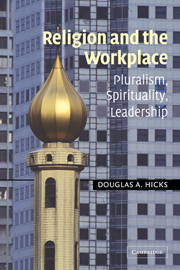Book contents
- Frontmatter
- Contents
- Acknowledgments
- Introduction
- PART I ANALYZING CURRENT REALITIES
- 1 The changing American context
- 2 The corporate interest in spirituality
- 3 Which spirituality in the workplace?
- 4 Conflicts at work: is religion distinctive?
- PART II MAPPING RELIGION AND THE WORKPLACE
- PART III CONSTRUCTING RESPECTFUL PLURALISM
- Bibliography
- Index
1 - The changing American context
Published online by Cambridge University Press: 02 December 2009
- Frontmatter
- Contents
- Acknowledgments
- Introduction
- PART I ANALYZING CURRENT REALITIES
- 1 The changing American context
- 2 The corporate interest in spirituality
- 3 Which spirituality in the workplace?
- 4 Conflicts at work: is religion distinctive?
- PART II MAPPING RELIGION AND THE WORKPLACE
- PART III CONSTRUCTING RESPECTFUL PLURALISM
- Bibliography
- Index
Summary
The challenge of negotiating religion and the workplace fits within a wider public context in which citizens debate the meaning of terms like religion, spirituality, ethics, diversity, commonality, conflict, and unity. This chapter explores changes in US public life that make an analysis of religion and the workplace fascinating, messy, and timely.
US citizens and leaders now confront challenges that few people had envisioned before the devastating events of September 11, 2001. Talk of religion in its myriad forms swirls in the public conversation about that tragic day and responses to it. Extremists who claimed a religious motivation for their terrorism too vividly demonstrate the power of religious ideas and commitments on adherents to produce disastrous effects. For their part, however, the overwhelming majority of US Muslim leaders and followers responded with firm rejections of any depiction of Islamic faith that supports the killing of civilians. Many commentators drew the painful image that the terrorists had hijacked Islam itself.
In the face of the attacks, religious people and nonreligious people united across boundaries to rescue the trapped, heal the sick, and comfort those who were mourning. A prayer service in the National Cathedral in Washington brought together religious and political leaders who drew upon many civic and religious traditions to mourn the dead. The following weekend a memorial event for grieving families, held in Yankee Stadium and broadcast across America, testified even more fully to the tremendous religious diversity of contemporary America.
- Type
- Chapter
- Information
- Religion and the WorkplacePluralism, Spirituality, Leadership, pp. 11 - 26Publisher: Cambridge University PressPrint publication year: 2003



